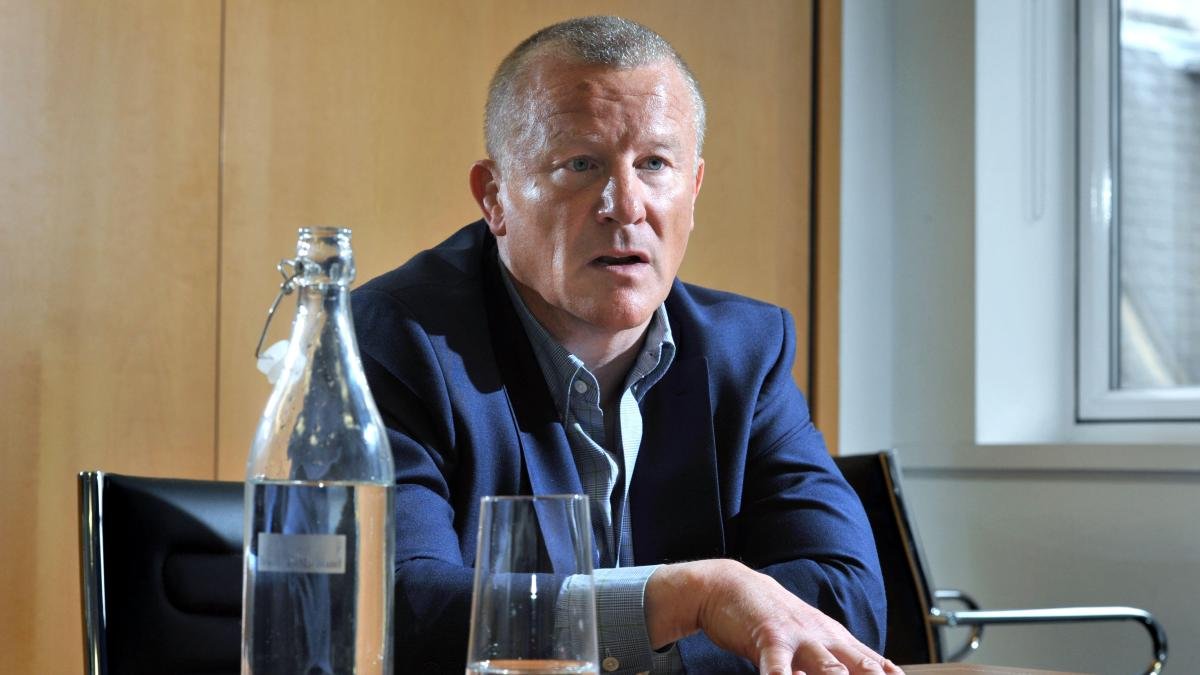Now Reading: August 5, 2025 — as it happened
-
01
August 5, 2025 — as it happened
August 5, 2025 — as it happened

As Wall Street opened, the FTSE 100 was on track for a new closing high, up 0.4 per cent, or 40 points, to 9,169.58. The previous closing high was 9,138.37 on July 24.
Wall Street indices rose on ongoing optimism over possible Federal Reserve interest rate cuts and strong results from companies such as Palantir Technologies, Pfizer and DuPont.
The S&P 500, Nasdaq composite and the Dow Jones industrial average rose 0.96 per cent, 0.07 per cent and 0.1 per cent respectively.
Yesterday, the indices recorded their best session since May 27 and recouped losses from a selloff on Friday when disappointing July jobs data fuelled expectations of a Fed rate cut in September.
Trump considers candidates for new Fed chief
President Trump said that Scott Bessent, the Treasury secretary, did not want to be nominated to replace Jerome Powell as the next chairman of the Federal Reserve.
“I asked him just last night, is this something you want?” Trump said Tuesday in an interview with CNBC. He said Bessent’s response was: “Nope, I want to stay where I am.”
Scott Bessent, the Treasury secretary
MAGNUS LEJHALL/REUTERS
Trump said he was considering four people for the role, including Kevin Warsh, a former Fed governor, and Kevin Hassett, director of the US National Economic Council. However he said he did not intend to make a decision soon.
On Friday, Adriana Kugler announced her plan to leave her Fed Board of Governors seat. She was not due to go until January and it gave Trump an earlier opportunity than expected to shape the central bank’s interest-rate-setting policies by picking a replacement.
YouGov shares rise sharply
Shares in YouGov, the polling group, have risen by almost a fifth today after a trading update that, on the surface, looked quite bland.
Updating shareholders after the end of its most recent financial year last week, YouGov said it expects to have achieved “modest year-on-year revenue growth” and that it remains mindful of “volatile market conditions” likely to pressure its clients’ budgets.
However, it was confirmation that its data products division, which carries out ongoing market research for corporate clients, had returned to growth that sparked the share price into action.
That division had been responsible for a shock profit warning in June 2024 which led to YouGov’s shares almost halving in one day. The company said it had managed to stem client losses and had actually picked up a “number of client wins” in recent months.
“This provides a good foundation for growth for the new [financial] year,” analysts at Peel Hunt, the investment bank, said. YouGov shares are up 53¼p, or 17.3 per cent, to 360¾p — still half what they were worth last summer.
The diminished trade deficit contributed heavily to the rebound in US gross domestic product in the second quarter
FREDERIC J BROWN/GETTY IMAGES
The US trade deficit narrowed in June, driven by a drop in consumer goods imports.
The overall goods and services trade gap shrank by 16 per cent in June to $60.2 billion, down from a revised $71.7 billion in May, according to the Department of Commerce’s Bureau of Economic Analysis.
The data is the latest evidence of the impact of Trump’s tariffs. Exports totalled $277.3 billion, down from more than $278 billion in May, while imports fell to $337.5 billion from $350.3 billion.
The diminished trade deficit contributed heavily to the rebound in US gross domestic product in the second quarter, reversing a drag in the first quarter when imports had surged as consumers and businesses rushed to buy goods ahead of the tariffs.
Molson Coors cuts guidance over aluminium costs
Molson Coors has faced a 50 per cent tariff on aluminium shipped into the US since June
DANIEL ACKER/GETTY IMAGES
Molson Coors, the brewing and drinks company, has forecast a bigger drop in its annual profits, blaming tariffs for an increase in the cost of aluminium it uses for its beverage cans amid macroeconomic uncertainty in the US.
The company, which produces its beer locally at breweries in Colorado, has faced a 50 per cent tariff on aluminium shipped into the US since June, when Trump doubled it from 25 per cent.
It now expects underlying pre-tax profits to fall by 12 per cent to 15 per cent compared with 2024, down from its previous forecast of a low single-digit decline. Net sales are also expected to fall more than previously anticipated.
The shares were down about 1.39 per cent in pre-market trading.
Sluggish demand hits Caterpillar profits
A slowdown in US construction spending has led to a decrease in demand for Caterpillar products
ERIC VIDAL/REUTERS
Caterpillar, often viewed as a bellwether for the industrial economy, has missed second-quarter profit expectations due to sluggish demand for construction equipment and warned of a hit of up to $1.5 billion due to costs tied to US tariffs this year.
Despite offsetting the impact of supply-chain disruption and cost inflation through price increases, a slowdown in US construction spending has led to a pullback in demand for its products such as excavators and backhoe loaders.
Net profits fell to $2.18 billion, down about 18.7 per cent from the same quarter a year earlier. Revenue dipped 1 per cent to $16.6 billion.
Caterpillar shares fell about 3 per cent in pre-market trading after it also flagged a tariff impact of $400 million to $500 million in the third quarter. The company cut its full-year adjusted profit margins to the bottom half of its annual target range as a result of manufacturing costs due to tariffs.
FTSE 100 set for new closing high
London’s leading share index strengthened in the run-up to noon, with the FTSE 100 up 0.49 per cent, or 45 points, to 9,173.58, helped by positive corporate results.
If the index closes at this level it will surpass the previous closing high of 9,138.37 set on July 24. However, it still has a way to go to before reaching its intraday high of 9,190.73.
The order of the main risers remains little changed since this morning with Smith & Nephew, the medical equipment maker, up 14.8 per cent after reporting better-than-expected first-half results and unveiling a $500 million share buyback.
Fresnillo, the precious metal miner, gained 5.5 per cent after it reported a 30 per cent rise in first-half revenues to $1.94 billion, mainly due to higher gold and silver prices. BP was 2.7 per cent higher after beating expectations for second-quarter profits and announcing a review of costs while Diageo rose 1.1 per cent after increasing its cost-saving target.
Tesco and J Sainsbury were among the biggest fallers after the latest services purchasing managers’ index survey showed that activity in the dominant services sector slowed in July.
Swiss president flies to Washington in bid to avert 39% tariffs
It is not clear who President Keller-Sutter will be meeting with in Washington
DENIS BALIBOUSE/REUTERS
President Keller-Sutter of Switzerland and Guy Parmelin, the Swiss business minister, will fly to Washington today in a last-ditch attempt to avoid the shock 39 per cent tariffs announced by President Trump on exports to the United States.
Yesterday Nick Hayek, the Swatch chief executive, urged Keller-Sutter to “get on a plane to Washington” to talk to Trump. He said: “It’s not doomsday. Of course a settlement can be reached. Why would Donald Trump say tariffs are coming on August 1 and not implement them until the 7th? The door is always open.”
The Swiss government said Keller-Sutter and Parmelin would “facilitate meetings with the US authorities at short notice and hold talks with a view to improving the tariff situation for Switzerland”.
It is not clear who they will meet or whether a meeting was scheduled with Trump. Switzerland had expected a tariffs rate of about 10 per cent.
The financial regulator has provisionally fined the investment expert Neil Woodford and Woodford Investment Management (WIM) a total of just under £46 million for failures in their management of the Woodford Equity Income fund.
The Financial Conduct Authority (FCA) said in its decision notices that it had fined Woodford £5.88 million and banned him from holding senior manager roles as well as from managing funds for retail investors. It also fined WIM £40 million.
The Woodford Equity Income fund (WEIF) was an investment fund managed by Woodford and WIM. The fund was suspended in June 2019, leaving investors unable to access their money. The value of the WEIF had fallen from a high of more than £10.1 billion in May 2017 to just £3.6 billion before its suspension.
Woodford and WIM have referred the decision notices to the Upper Tribunal where each will present their case. The FCA said: “Any findings in the decision notices are therefore provisional and reflect the FCA’s belief as to what occurred and how it considers their behaviour should be characterised.”
Services sector growth slows
Risk aversion and low confidence among clients were some of the reasons given for sluggish sale pipelines
GETTY IMAGES
Activity in the dominant services sector slowed in July with new orders falling at the fastest rate since the aftermath of the mini-budget in November 2022 and staffing levels cut at the sharpest rate in six months, the latest purchasing managers’ index (PMI) survey showed.
July’s S&P Global PMI survey for the services sector, which makes up more than 80 per cent of the economy, slid to 51.8 from June’s 52.8.
New business fell sharply, with the sub sector falling to 47.7 from 51.3, below the 50 level that divides growth from contraction. The employment component fell to 45.6 from 47, its lowest level since February, which S&P said reflected “hiring freezes and redundancies in response to subdued demand and robust input cost inflation” after a rise in labour costs for businesses.
Tim Moore, S&P Global Market Intelligence’s economics director, said: “Risk aversion and low confidence among clients were the main reasons provided for sluggish sales pipelines, alongside an unfavourable global economic backdrop.”
Tesla’s sales woes deepen
Tesla’s new car sales in Britain dropped by nearly 60 per cent year-on-year to 987 units in July, down from 2,462 in the same month last year, figures from the Society of Motor Manufacturers and Traders (SMMT), the industry body, showed today.
Data last week showed that registrations of new Tesla cars in several key European markets fell in July, despite a revamp to its Model Y, as the electric carmaker struggles with a backlash against its chief executive Elon Musk’s political views, regulatory challenges and fierce competition.
Overall, new car registrations in Britain fell by about 5 per cent year-on-year in July to 140,154 units, the SMMT said, with growth in battery electric vehicle sales moderating to 9.1 per cent in the month. Battery electric vehicles are now projected to account for 23.8 per cent of new registrations in 2025, slightly up from SMMT’s previous forecast of 23.5 per cent.
Mike Hawes, the SMMT chief executive, said: “July’s dip shows yet again the new car market’s sensitivity to external factors, and the pressing need for consumer certainty.”
Ryanair carries record 20.7m passengers in July
Michael O’Leary, Ryanair’s chief executive
EVELYN HOCKSTEIN/REUTERS
Europe’s biggest airline has reported a 3 per cent year-on-year rise in passenger numbers in July to a new monthly record of 20.7 million, despite cancellations due to strikes in France.
Ryanair said it operated more than 113,000 flights during the month but that 680 flights were cancelled, mostly due to French air traffic control strikes which disrupted the travel plans of tens of thousands of passengers.
Michael O’Leary, the chief executive of Ryanair, has said the regularity of French strikes means such industrial action has become “recreational” and urged Brussels to intervene. He claimed the air traffic controllers were using the start of the holiday season to leverage their bargaining power.
The load factor, a measure of how full the budget carrier’s planes are, was 96 per cent, the same as in July last year.
Corporate results lift FTSE 100
London’s leading share index rose for the second day this week, lifted by strong corporate results and a rebound on Wall Street and in Asian stock markets.
The FTSE 100 has risen 26 points, or 0.28 per cent, to 9,154.29 after starting the week on a positive note with its fifth-highest close.
Smith & Nephew reported better-than-expected first-half results
SMITH & NEPHEW
Smith & Nephew, the medical equipment maker, rose 11 per cent after reporting better-than-expected first-half results and unveiling a $500 million share buyback.
Diageo rose 6.9 per cent after increasing its cost-saving target and BP was 1.2 per cent higher after beating expectations for second-quarter profits.
Fresnillo, the precious metal miner, gained 8.5 per cent after it reported a 30 per cent rise in first-half revenues to $1.94 billion, mainly due to higher gold and silver prices. The increase was driven by greater volumes of gold sold, though partially offset by a lower volume of silver sold. Gold is trading at $3,373 an ounce today, close to a more than one-week high achieved in the last session.
Domino’s Pizza hit as consumers cut back
Domino’s Pizza, the master franchise holder for the UK and Ireland, has lowered its full-year profit outlook due to higher employment costs and weak demand as customers cut back on spending amid rising prices.
In its first-half results, the company said it now expected full-year underlying profits (Ebitda) to be in the range of £130 million to £140 million. This compared to analysts’ expectations of £140.8 million to £149.2 million. First-half statutory pre-tax profits dropped 32 per cent to £40.5 million.
In other corporate news:
Smith & Nephew: The medical equipment maker reported a 5 per cent rise in revenue on an underlying basis and an 11 per cent increase in its trading profit over the first six months of the year, which was stronger than what analysts had forecast. The encouraging figures are a boost to the FTSE 100 group as it comes under increasing scrutiny from Cevian Capital, the activist investor that raised its stake in the company to 8.5 per cent last month. It also unveiled a $500 million share buyback.
Travis Perkins: The building materials supplier reported a 2.1 per cent decline in revenue and a 24 per cent drop in its adjusted operating profit over the first half of the year, blaming “operational challenges”. However, it said that it expected to deliver full-year results that were in line with market expectations.
Diageo doubles down on cost cutting
Bottles of Johnnie Walker whiskey, one of the drinks brands owned by Diageo
MIKE WILKINSON/GETTY IMAGES
The global drinks company, which owns the Guinness and Johnnie Walker brands, said it will go further in cutting costs as it seeks to revive investor confidence, in its first performance update since the abrupt departure of Debra Crew, its former chief executive, last month.
Diageo has raised its savings target to $625 million, from $500 million, over the next three years, as it reported organic sales growth of 1.7 per cent for the 12 months to the end of June. Sales volumes rose 0.9 per cent, while price inflation and product mix contributed 0.8 per cent. City analysts had forecast underlying growth of 1.4 per cent.
Nik Jhangiani, the former finance chief who has stepped into the top job on an interim basis, said: “While macroeconomic uncertainty and the resulting pressure on consumers continues to weigh on the spirits sector … We are focused on what we can manage and control and executing at pace.”
The FTSE 100 group has been grappling with slowing growth in key markets, shifting drinking patterns and a lack of strategic clarity, which led to the departure of Crew, who was appointed chief executive in 2023.
BP to launch strategic review under new chairman
The Eastern Trough Area Project, a BP-operated oil and gas hub in the UK North Sea
ANDY BUCHANAN/POOL/GETTY IMAGES
BP is to conduct a sweeping review of its portfolio and costs under its incoming chairman, Albert Manifold, as Murray Auchincloss, its chief executive, pledged that it “can and will do better for its investors”.
The FTSE 100 oil company announced the plans as it reported that underlying profits fell by 15 per cent to $2.4 billion in the second quarter amid lower commodity prices. The result was, however, significantly better than the $1.8 billion analysts had forecast.
Auchincloss announced in February that he would “fundamentally reset” BP’s strategy but is under pressure from Elliott, the investment management firm, to make more radical changes.
He said: “In advance of chair-elect Albert Manifold joining the board on 1 September, he and I have been in discussions and have agreed that we will conduct a thorough review of our portfolio of businesses to ensure we are maximising shareholder value moving forward — allocating capital effectively. We are also initiating a further cost review and, whilst we will not compromise on safety, we are doing this with a view to being best in class in our industry.”
Spectris backs sweetened KKR offer
Spectris provides instruments, test equipment and software for industrial applications
The bidding war for the FTSE 250 company Spectris has intensified after its board switched its recommendation from Advent International to a sweetened £4.2 billion offer from rival US private equity firm KKR.
KKR’s increased cash offer for the instrumentation and testing group values each Spectris share at £41.75, comprising £41.47 in cash and an interim dividend of 28p per share. It trumps Advent’s revised £41-a-share cash offer on Friday, which also included the interim dividend.
Spectris is being advised by Goldman Sachs, Rothschild and Bank of America Securities. The company employs 7,600 people and provides instruments, test equipment and software for industrial applications.
The group is one of several UK technology specialists attracting takeover interest from American private equity firms this year, with Oxford Ionics, a quantum computing start-up, and Alphawave IP Group, the manufacturer of high-speed connectivity and computer silicon, also receiving bids.
Trump threatens India over Russian oil
President Trump wants India to stop buying Russian oil as Washington seeks ways to push President Putin to make a peace deal with Ukraine
AP
Oil prices remained lower after output increases by Opec+ aimed at regaining market share and threats by President Trump to raise tariffs on India over its Russian petroleum purchases.
The benchmark Brent crude futures contract is down 0.28 per cent to $68.57 a barrel this morning, its lowest level in a week.
India is the biggest buyer of seaborne Russian crude. Trump wants the country to stop buying Russian oil as Washington seeks ways to push Moscow for a peace deal with Ukraine. He is threatening to impose 100 per cent secondary tariffs on buyers of Russian crude.
Trump wrote on Truth Social: “India is not only buying massive amounts of Russian Oil, they are then, for much of the Oil purchased, selling it on the Open Market for big profits. They don’t care how many people in Ukraine are being killed by the Russian War Machine. Because of this, I will be substantially raising the Tariff paid by India to the USA.”
Stock markets climb a wall of fear
The Dow, S&P 500 and Nasdaq bounced back Monday from Friday’s sell-off
SHUTTERSTOCK EDITORIAL
Some Wall Street banks are warning clients to prepare for a market pullback, even as Wall Street indices rebounded from last week’s sell-off.
Morgan Stanley, Deutsche Bank and Evercore all cautioned that the S&P 500 index is due for a near-term drop due to the fallout from President Trump’s trade war, including slowing consumer spending, weaker economic growth, higher unemployment and potentially rising inflation.
Mike Wilson, the Morgan Stanley strategist, forecasts a correction of up to 10 per cent this quarter, while Evercore’s Julian Emanuel is expecting as much as 15 per cent.
For now stock markets seem unfazed. Shares in Asia rose for a second day. Japan’s Nikkei gained 0.6 per cent, supported by data showing a jump in the nation’s service sector activity in July. Meanwhile, mainland China’s SSE Composite gained 0.5 per cent after services activity expanded at its fastest pace in 14 months in July.
The FTSE 100 is forecast to open 30 points higher when trading begins.

































































